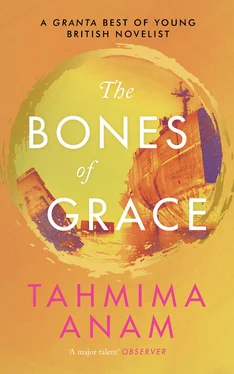‘It must be hard, not knowing.’
‘I’m afraid of what it means. And I feel alone in the world.’
‘Loneliness is just part of being a person. We long for togetherness, for connection, and yet we’re trapped in our own bodies. We want know the other fully, but we can’t, we can only stretch out our hands and reach.’
It was so close to what I had felt an hour or two ago, when you had touched me and then untouched me, that I said, ‘I think that’s the best thing anyone has ever said to me,’ and you smiled, your lips disappearing into your beard. You said were pleased to have been given the opportunity to say the right thing. Then you asked me to tell you more about Dhaka. ‘I don’t know anyone from Bangladesh. In fact, I can’t say I know any whale-hunting Shostakovich fans from any country.’ I was charmed by this description of myself. I said you should come and see the place for yourself. You said you would like that. I told you how my parents had met during the Bangladesh War, that it had been the event that had framed their lives, and mine. We talked about that for a bit, and I gave you the potted history of my country I had narrated many times in the last seven years.
The café closed and we stepped out into the night, which was bright with heat and cones of streetlight. We drifted slowly towards my apartment. There seemed an infinite number of things left to say. We hesitated at the top of my street, reluctant to part, and, if I had paused to think for a moment, I may have had a premonition of what was to come: breaking your heart, finding my mother, Grace , the end and the beginning, the pulling crew, the discovery of love and its abandonment, and my telling you this story of our love, and of Anwar, and my mother. But I didn’t pause, and the clairvoyant moment passed me by, and so we said an ordinary goodbye, promising to meet in the morning. When we parted, I felt my mind freeing itself of the story of my birth and turning to more graspable things, the dig I was about to go on, the fossil that was waiting in the earth, the lip balm and magazines I needed to buy before I departed.
You will wonder, as I often have, about the precise moment we fell in love. Was it on Grace , after you played the piano, or was it before that, the moment I saw you through the print-smudged glass at Chittagong Airport, or in your parents’ living room, or as we parted that first evening, Shostakovich soaring in my music-mind, turning around as you walked away so that I could see you retreat with slow steps in your sandalled feet and hippy trousers?
But I should tell you now that it was not that night, because that night, I did not believe in love. I knew, of course, that it existed. I knew that it was the central principle around which most people built their lives, and I wasn’t foolish enough to assume that it was something I could avoid entirely. But I did not believe that I lived in an age when a great love was possible. Everything about my life was too easy. I could love whomever I wanted, and marry or not marry them, or change my religion, or get divorced multiple times and have children with three different fathers if I wanted. I came from what you might call a traditional society, but I was not in thrall to that society. What I was in thrall to was the past. This had to do with my parents and the war they had been in, and, as a model for love, for what was possible between two people, they had set an example that fixed in my mind the notion that the epic thing, the one that went down in legend and song and was anointed with passion that lasted beyond beauty and youth, was something that only happened to other people, people that came before me or were born into magical, troubled times. I didn’t believe that I was immune — of course I would love, and be loved — but I had proposed to myself a life that respected its historical moment and demanded something less, something tamer than those deeper furrows and interruptions of the heart.
As for you, if you had asked me, I wouldn’t have been able to give you a single reason for your interest in me. I told myself this: (a) I would make an amusing anecdote for you later. Hey, you would tell yourself, I met this Bangladeshi palaeontologist and we listened to Shostakovich and then Nina Simone and she loves Anna Karenina . What’re the odds? Or, (b) you felt sorry for me. Or, (c) you were actually a social outcast, totally unlikable and in desperate need of company, and I just couldn’t see it. There was, of course, another option, which was that your interest in me was genuine — but I couldn’t really fathom that, because I would have had to change my own understanding of myself and admit that I was what you were looking for, and that would have been beyond my imagination.
Now that my estimation of myself has taken a significant battering, I can say this: you did love me. You loved me from the very start. It could have been because you found me beautiful, or interesting, but more than that, it was because, although you bore none of the outward signs of being anything like me, we were, in fact, very similar. In me you saw embodied all the things you had felt about yourself: that you had been born into the wrong family, that there were things within you that had yet to be voiced and you might, if you were lucky, find yourself uttering them in my presence. In other words: we were nothing, yet everything alike. And you had the wisdom to see that from the start, even if I didn’t.
As I approached the apartment, I could hear music spilling out onto the street, and then I remembered my goodbye party. I called Bettina, the anthropologist I had lived with since my first year, and my closest friend in Cambridge. ‘Sorry.’
‘You’re late,’ she said.
‘I met someone.’
‘An Amphibian?’ ‘Amphibian’ was our code word for people like us. Bettina was Argentinian, born in Queens, had grown up in Buenos Aires when her parents had decided to un-immigrate themselves, gone to college in Paris, taken several years off and backpacked through China, where she had been bitten by monkeys, and landed up here, in Cambridge, by which time her parents had returned to their place in Astoria, chastened by the more exciting side of the planet. ‘Amphibian’ signalled people in between, people who lived with some part of themselves in perpetual elsewhere. ‘No,’ I said. ‘Waspish, by all accounts.’
‘Honey, if you’re going to cheat, at least put some colour in it.’
I tried to conjure Rashid’s face in my mind, stoking my memories for a feeling of tenderness, arousal, something — but nothing came, so I said, ‘It’s not like Rashid and I are married.’
‘Where are you? I can hear music.’
‘I’m on the porch.’
‘We can unpack this later. Hang up and come inside.’
Bettina had installed an air conditioner in the living room the summer before, and, though the apartment was crowded, it was cooler than the street. I scanned the room and saw my lab partner, Kyung-Ju, and a few other graduate students from my department, but it was mostly anthropologists, the coolest and most depressed social scientists, huddled together in small clusters. I caught fragments of their conversation, complaints about the new department chair, a journal article one of them had failed to get published, a new class on semiotics, the fraud that was Slavoj Žižek. I had gotten to know them well; they spent a lot of time at our apartment, drinking tea and watching television ironically. My own friends from the Department of Organismic and Evolutionary Biology, on the other hand, preferred to get drunk on weekends, letting themselves into the prep lab or falling asleep between the shelves of the Invertebrate collection. Bettina often joked that I was in the wrong department, but there was something pleasantly straightforward about scientists, and I found I could live among them without giving much away, and, in those days, hiding in plain sight was what I did best.
Читать дальше












